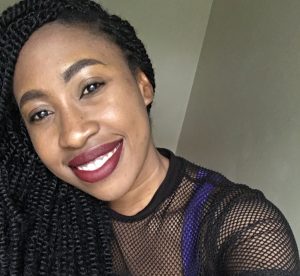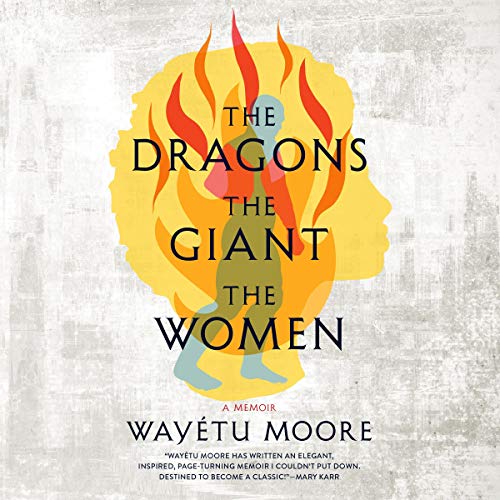[av_hr class=’custom’ height=’50’ shadow=’no-shadow’ position=’center’ custom_border=’av-border-fat’ custom_width=‘100%’ custom_border_color=’#1f4e78′ custom_margin_top=’30px’ custom_margin_bottom=’30px’ icon_select=’no’ custom_icon_color=” icon=’ue808′ font=’entypo-fontello’ admin_preview_bg=”]
When I began reading The Dragons, the Giant, the Women, I had the expectations of a story about an author’s liberation from a country ravaged by war. But then I got something much better than that.
The Dragons, the Giant, the Women is a beautiful memoir by outstanding writer Wayétu Moore, detailing her harrowing experience as a child fleeing Liberia with her family from the First Liberian Civil War in 1989. The war, cited as one of the bloodiest wars in the whole of Africa till date, lasted for seven long years (1989-1997), culminating with the swearing in of Charles Taylor as the President of Liberia. I remember being a young child during those years, living in Nigeria with my family, and occasionally watching the news on TV about Liberia, most especially because back then our Military President, General Sani Abacha, was instrumental in helping Liberia with support during that war. I remember seeing footage of the numerous numbers of Liberians fleeing on foot from their country, walking through the roads and bushes with their families, their children, with their properties lifted high on their heads or wrapped in Ankara wrappers and slung over their shoulders. Back then, it was just news footage. Although harrowing, it is refreshing to read now from the perspective of someone who indeed walked through those roads, who lived through that horror, who witnessed the decimation of a country they cherished and loved.
Wayétu Moore has a grace of language that I long to have for my writing. From the start of the memoir, I was pulled in with that language—how she described her family’s lives in the perfect ways, the longing for her mother who, at the time, resided in faraway America, in New York City. There is a childish innocence to the author’s voice, from her descriptions of living within a home of siblings and a doting helper, to the love of a father and grandmother, affectionately referred to as Ol’ Ma. Her relationship with her mother is not just deep and invoking but gives insight as to how she reveres not just her physical presence from the house but her absence, referring to her even in thoughts. This is made known right from the first chapter of the book itself. Wayetu’s relationship with her mother is one that I do not just admire but I am reminded of with my own mother, an existence of something so pure, so genuine, lasting beyond sight but thrives in memory.
There are so many lines in this book that fed my soul, and on page 2 of the first chapter I come across the first: “They convinced me that Liberia’s sweetness was incomparable—more than a ripe mango’s strings hanging between my teeth after sucking the juice of every sticky bite, the Ol’ Ma’s milk candy that melted on my tongue, sugar bread, even America—none a match for the taste then, of my country. This was all I knew of my home then—that I lived in a place that made words sing, so sweet. Yet it was without my mother.” The beauty of this paragraph is that it seeks to explain with sensory imagery and descriptive language how one yearns for a place called home in the past that they feel alienated to in the present. We see Wayétu paint a picture of nostalgia for a Liberia built in her memories, a place without war or strife, with the abundance of love from family, but then that memory still misses out a vital piece—the presence of her mother, who had to move to America for her Ph.D. I related in ways to this as a Nigerian who is currently away from home, family, and besieged with memories of what I have always known; the sounds and smells of what my country is, the emptiness of where my mother resides in my thoughts, her memory while alive the only thing I hang on to. There was a relationship of my thoughts and the writer’s in relation to this, and I loved it immensely.
Another thing I admired about this memoir is the beauty of its language. It comes from a place of established authority but renders it with a certain lyricism and poetic nature. One reference to this would be Chapter six, and other chapters within, which is entirely written in what I believe is a stream of consciousness. This chapter details a child’s bewilderment and confusion of war, her reactions to terror, the imperfect beauty of the thought process a child exhibits even within that confusion. As I read through these chapter, I ran with Wayétu through the sugar fields. I felt every motion experienced, down to the yearning for her forgotten shoes. Maybe this was why the author felt it necessary to write this in a stream of consciousness, to invoke the breathlessness of fleeing terror and the effect of fear, particularly from the eyes of a child. The descriptions were stellar—from the rendition of dead bodies as sleeping bodies with frozen faces, to referring to shooting guns as “drums beats.”
All the sensory details, the rightful explanations and the plot itself, took away the horror of war and instead, crafted a beautiful writing that flayed the reader open tenderly, letting them absorb the words like a soaked sponge. But then, coming from such a stellar writer herself, this is no surprise. With her earlier debut novel, She Would Be King, one could already say Wayétu Moore excels at building a world that, real or not, it is beautiful in language and words. Now with this memoir, we can say succinctly that Wayétu Moore has created a masterpiece that will last through a generation of readers who lived, witnessed, and remember the time when Liberia throbbed with disunity, but can be soothed with the knowledge of this wonderful writer’s story of her life and a time that had been, knowing that her story, like many others, was finally written, and written exceptionally well.
The Dragons, The Giant, the Women is out now. Though this book is nonfiction, Wayétu has also approached similar material through the lens of fiction, and you can get a taste of her writing in a short story she wrote for another magazine.
I had the chance to ask Wayétu a few questions about her brilliant book.
Amara Nicole Okolo: Your writing and language in The Dragons, The Giant, The Women is graceful and exceptionally poignant, especially in context of the subject matter—war, death and carnage. Was this done intentionally, to ease the reader through the horrors the people faced in the memoir?
Wayétu Moore: I cannot imagine who I would be without that experience, without the horrors of that year in my childhood. I have reconciled and in hindsight, I see it, our displacement, as the beginning of everything. I try to handle that year with a sense of gratefulness and hope, because I understand that my story could have ended much differently than it did. Perhaps it’s the gratitude that you are identifying as grace. Thank God for that—because I do know that with so much dysfunction going on in our real world, this is a tough story. Who wants to read more about trauma? I’m grateful that you felt at ease. Thank you.
ANO: In a section of the book, you write about an incident that occurred at the grocery store, and you go into details of how racism in America was a bit of a shock to you at first, stemming from the fact that as an immigrant of African descent, you had not experienced it in Liberia, a fully Black nation, even though at war. You write, “I did not talk about the war or Liberia beyond my classmates’ general knowledge that I was ‘African.’ I did not have the time to give while I was trying to understand that in this new place that Mam and Papa had told us was home, skin color was king—king above nationality, king above life stories, and yes, even king above Christ.” As a Nigerian immigrant living in the US, I too struggle with this. As a young girl growing up then, how did this impact your perspective of how you viewed the world?
WM: At first, lonely. There is was ever-present loneliness that consumed my life and teenage years when I realized I lived in the middle of two homes, and that I understood both of them fully, but they did not understand me. I was at first devastated when I realized I could not live in both at the same time, and that I would never be able to. Accepting my cross-cultural identity, making a bed in the middle of those homes as someone who is as African as I am American, being okay with the possibility that I would never fully feel 100% of any culture, is what gave me peace. That peace, coupled with my knowledge of how vast one human experience can be, is what governs my creativity. I became (and remain) curious about themes like identity and culture and home. About loneliness and acceptance. I constantly analyze. I am always looking for the layers beneath, for those who make beds between homes.
ANO: As a young African child growing up in Nigeria during the time of the Liberian war, who heard so much of it in passing, this memoir has given me a personal perspective of those sad times, and I want to thank you for writing about it. What are you most hoping readers will take away from this book?
WM: Liberian history and perceptions of the war have assumed the trope narrative of Americo-Liberian settlers vs. native Liberian tensions. Our history is usually explored in the context of that binary. No history is that simple. Our conflict was more complex than that. There were multi-ethnic, centuries-old dilemmas that were simultaneously culminating during those years. It is important to me to delve into some on those historical complexities in my work, and for readers to experience that. I also want to remind people, especially now, that not all sad stories have unfortunate endings. There is (usually) transformation, renewal, and even sometimes long spells of joy after periods of trauma. I live by this. Rainy seasons end. I hope readers find hope in that.
[av_hr class=’custom’ height=’50’ shadow=’no-shadow’ position=’center’ custom_border=’av-border-fat’ custom_width=‘100%’ custom_border_color=’#1f4e78′ custom_margin_top=’30px’ custom_margin_bottom=’30px’ icon_select=’no’ custom_icon_color=” icon=’ue808′ font=’entypo-fontello’ admin_preview_bg=”]
[av_one_half first] [/av_one_half]
[/av_one_half]
[av_one_half]Amara Nicole Okolo is the author of three books, Black Sparkle Romance, Son of Man, & Daughters of Salt. She is also a lawyer. Her essay “The Things We Never Say” was published by Catapult (2017) & her fictional story “Swallowed Things” by the Panorama Journal of Intelligent Travel (2018), the latter of which earned her a nomination for the Pushcart Prize. She is currently the Emerging Writer Scholar at VCFA. Her writing is partly inspired by/focused on medical conditions.[/av_one_half]
[av_hr class=’custom’ height=’50’ shadow=’no-shadow’ position=’center’ custom_border=’av-border-fat’ custom_width=‘100%’ custom_border_color=’#1f4e78′ custom_margin_top=’30px’ custom_margin_bottom=’30px’ icon_select=’no’ custom_icon_color=” icon=’ue808′ font=’entypo-fontello’ admin_preview_bg=”]
[av_one_half first] [/av_one_half]
[/av_one_half]
[av_one_half]Wayétu Moore is the founder of One Moore Book, a non-profit organization that creates & distributes culturally relevant books for under-represented readers. Her first bookstore opened in Monrovia, Liberia in 2015.Her writing can be found in The New York Times, The Paris Review, Guernica, The Atlantic Magazine, & other publications. She has been featured in The Economist Magazine, NPR, & Vogue Magazine, among others, for her work in advocacy for diverse children’s literature. She’s a graduate of Howard University, University of Southern California, & Columbia University.[/av_one_half]
[av_hr class=’custom’ height=’50’ shadow=’no-shadow’ position=’center’ custom_border=’av-border-fat’ custom_width=‘100%’ custom_border_color=’#1f4e78′ custom_margin_top=’30px’ custom_margin_bottom=’30px’ icon_select=’no’ custom_icon_color=” icon=’ue808′ font=’entypo-fontello’ admin_preview_bg=”]
Nike shoes | Best Custom Jordans of All Time – Fashion Inspiration and Discovery
